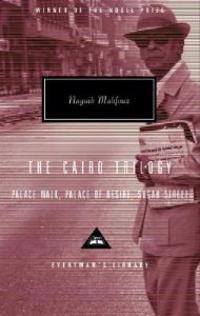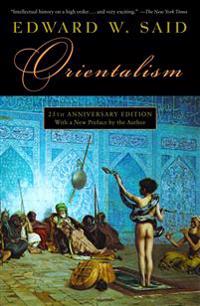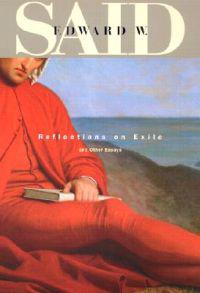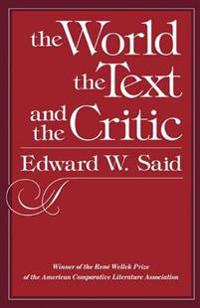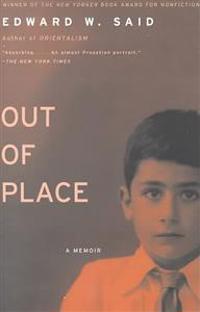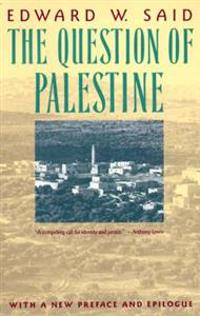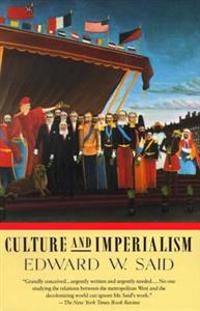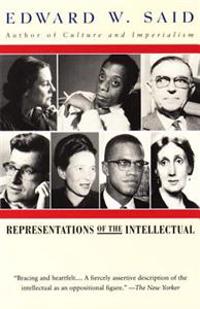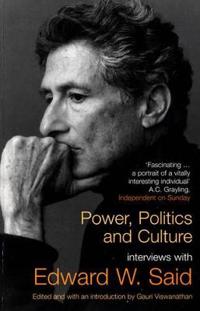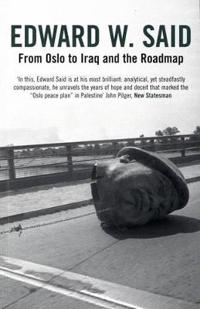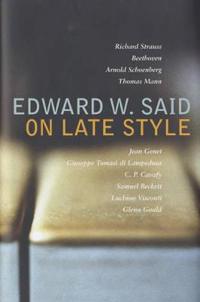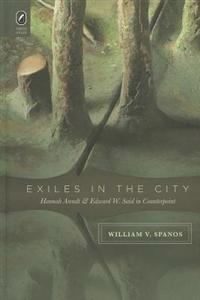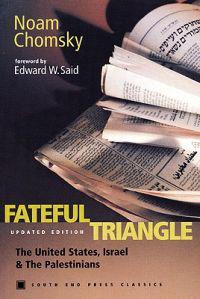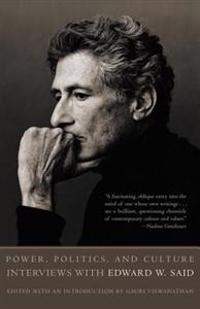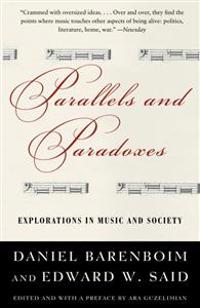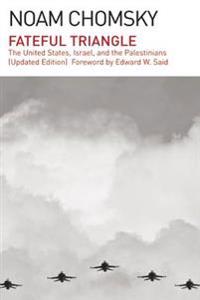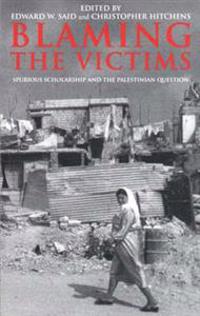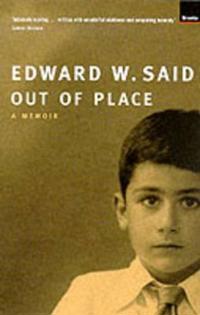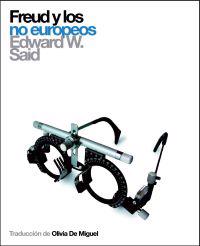Joseph Conrad and the Fiction of Autobiography (Övrig)
avEdward W. Said
ISBN: 9780231140058 - UTGIVEN: 2007-08-01Edward W. Said locates Joseph Conrad's fear of personal disintegration in his constant re-narration of the past. Using the author's personal letters as a guide to understanding his fiction, Said draws an important parallel between Conrad's view of his own life and the manner and form of his stories.[...]
The Cairo Trilogy: Palace Walk, Palace of Desire, Sugar Street (Inbunden)
avNaguib Mahfouz, Edward W. Said
ISBN: 9780375413315 - UTGIVEN: 200110Orientalism (Pocket)
avEdward W. Said
ISBN: 9780394740676 - UTGIVEN: 197910The noted critic and a Palestinian now teaching at Columbia University, examines the way in which the West observes the Arabs[...]
Reflections on Exile and Other Essays (Häftad)
avEdward W. Said
ISBN: 9780674009974 - UTGIVEN: 200211With their powerful blend of political and aesthetic concerns, Edward W. Said's writings have transformed the field of literary studies. This long-awaited collection of literary and cultural essays, the first since Harvard University Press published "The World, the Text, and the Critic" in 1983, rec[...]
The World, the Text, and the Critic (Häftad)
avEdward W. Said
ISBN: 9780674961876 - UTGIVEN: 1984-09Argues that contemporary critics force works of literature to fit their theories and examines the impact of Marxism, linguistics, psychoanalysis, and structuralism on literary criticism[...]
Out of Place: A Memoir (Häftad)
avEdward W. Said
ISBN: 9780679730675 - UTGIVEN: 2000-09From one of the most important intellectuals of our time comes an extraordinary story of exile and a celebration of an irrecoverable past. A fatal medical diagnosis in 1991 convinced Edward Said that he should leave a record of where he was born and spent his childhood, and so with this memoir he re[...]
The Question of Palestine (Inbunden)
avEdward W. Said
ISBN: 9780679739883 - UTGIVEN: 200302Still a basic and indespensible account of the Palestinian question, updated to include the most recent developments in the Middle East- from the intifada to the Gulf war to the historic peace conference in Madrid.[...]
Culture and Imperialism (Häftad)
avEdward W. Said
ISBN: 9780679750543 - UTGIVEN: 199405A landmark work from the intellectually auspicious author of Orientalism that explores the long-overlooked connections between the Western imperial endeavor and the culture that both reflected and reinforced it. "Said is a brilliant . . . scholar, aesthete and political activist."--Washington Post B[...]
Representations of the Intellectual (Häftad)
avEdward W. Said
ISBN: 9780679761273 - UTGIVEN: 199604Power, Politics and Culture (Häftad)
avEdward W. Said
ISBN: 9780747574699 - UTGIVEN: 200503No single book has encompassed the vast scope of Edward Said's erudition quite like Power, Politics and Culture - a collection of his interviews from the last three decades. In these twenty-nine interviews, Said addresses everything from Palestine to Pavarotti, from his nomadic upbringing under colo[...]
From Oslo to Iraq and the Roadmap (Häftad)
avEdward W. Said
ISBN: 9780747576624 - UTGIVEN: 2005-08From Oslo to Iraq and the Roadmap is Edward Said's final collection of essays, written between the end of 2000 and early 2003. They offer Said's commentary on the deepening crisis in the Middle East: pre-September 11 to the bombing of the World Trade Centre, through to the bombing of Afghanistan and[...]
On Late Style (Inbunden)
avEdward W. Said
ISBN: 9780747583653 - UTGIVEN: 2006-05Based on a hugely popular graduate seminar that Said taught in the fall of 1995 at Columbia, On Late Style examines the work produced by Richard Strauss, Ludwig van Beethoven, Arnold Schoenberg, Thomas Mann, Jean Genet, Giuseppe Tomesi di Lampedusa, C.D. Cavafy, Samuel Beckett, Luchino Visconti, and[...]
Exiles in the City: Hannah Arendt and Edward W. Said in Counterpoint (Inbunden)
avWilliam V. Spanos
ISBN: 9780814211939 - UTGIVEN: 2012-07"Exiles in the City: Hannah Arendt and Edward W. Said in Counterpoint, " by William V. Spanos, explores the affiliative relationship between Arendt's and Said's thought, not simply their mutual emphasis on the importance of the exilic consciousness in an age characterized by the decline of the natio[...]
Fateful Triangle: The United States, Israel, and the Palestinians (Häftad)
avNoam Chomsky, Edward W. Said
ISBN: 9780896086012 - UTGIVEN: 199904ContentsForeword by Edward W. Said
Preface to the Updated Edition
1. Fanning the Flames
2. The Origins of the "Special Relationship"
3. Rejectionism and Accommodation
4. Isreal and Palestine: Historical Backgrounds
5. Peace for Galilee
6. Aftermath
7. The Road to Arma[...]Power, Politics, and Culture (Häftad)
avEdward W. Said, Gauri Viswanathan
ISBN: 9781400030668 - UTGIVEN: 2002-08Parallels and Paradoxes: Explorations in Music and Society (Häftad)
avEdward W. Said, Daniel Barenboim
ISBN: 9781400075157 - UTGIVEN: 200403These free-wheeling, often exhilarating dialogues--which grew out of the acclaimed Carnegie Hall Talks--are an exchange between two of the most prominent figures in contemporary culture: Daniel Barenboim, internationally renowned conductor and pianist, and Edward W. Said, eminent literary critic and[...]
Fateful Triangle: The United States, Israel, and the Palestinians (Updated Edition) (Häftad)
avNoam Chomsky, Edward W. Said
ISBN: 9781608463992 - UTGIVEN: 2015-01From its establishment to the present day, Israel has enjoyed a special position in the American roster of international friends. In Fateful Triangle Noam Chomsky explores the character and historical development of this special relationship.[...]
Freud and the Non-European (Pocket)
avSaid, Edward W
ISBN: 9781844675111 - UTGIVEN: 2004-07-22Using an impressive array of material from literature, archaeology and social theory, Edward Said explores the profound implications of Freuds Moses and Monotheism for Middle-East politics today. The resulting book reveals Said's abiding interest in Freud's work and its important influence on his ow[...]
Blaming the Victims (Häftad)
avEdward W. Said
ISBN: 9781859843406 - UTGIVEN: 2001-04Since the 1948 war which drove them from their homeland, the Palestinian people have consistently been denied the most basic democratic rights. Blaming The Victims shows how the historical fate of the Palestinians has been justified by spurious academic attempts to dismiss their claim to a home with[...]
Out of Place (Häftad)
avEdward W. Said
ISBN: 9781862073708 - UTGIVEN: 200009Edward Said experienced both British and American imperialism as the old Arab order crumbled in the late forties and early fifties. This account of his early life reveals the influences that have formed his books, "Orientalism" and "Culture and Imperialism".[...]
Freud y Los No Europeos (Häftad)
avEdward W. Said
ISBN: 9788493421366 - UTGIVEN: 201202Censured and ultimately banned by the Freud Institute in Vienna, this lecture was eventually delivered by Edward Said at the Freud Museum in London. In it, he drew on sources from literature, archaeology, and social theory to examine the profound significance that "Moses and Monotheism," Sigmund Fre[...]
Orientalisme (Häftad)
avEdward W. Said
ISBN: 9788778671349 - UTGIVEN: 2002Med udgangspunkt i en kronologisk og tematisk gennemgang af den vestlige akademiske og litterære fremstilling af Orienten og den islamiske kultur kortlægger forfatteren forbindelsen mellem viden og magt fra Napoleons egyptiske felttog i 1798 ogtil USA's m[...]
Arche : tidskrift för psykoanalys, humaniora och arkitektur (Tidskrift)
avPer Magnus Johansson, Michel Foucault, Johan Linton, Henri F. Ellenberger, Edward W. Said, Mats Leffler, Thomas Karlsohn, Ulf Karl Olov Nilsson
ISBN: 9789197826471 - UTGIVEN: 201204Detta nummer av Arche, 2012:38-39, utgör delvis en fortsättning på det tema kring Michel Foucaults doktorsavhandling Vansinnets historia under den klassiska epoken (1961) som inleddes i nummer 2011:34-35. Tonvikten ligger denna gång mer på Foucaults betydelse för diskussionen om psykiatrin än[...]


